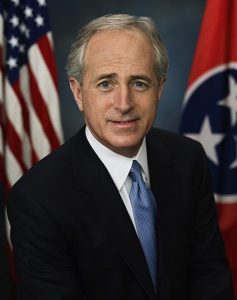
Bob Corker
U.S. Sen. Bob Corker (R-TN) highlighted the urgency of the global food crisis and the importance of humanitarian aid during a recent visit to the Bidi Bidi refugee camp in Uganda, which hosts more refugees than any other place in the world.
Corker was joined by U.S. Sen. Chris Coons (D-DE) in touring the camp where 270,000 refugees from South Sudan fled amid war and a global food crisis that has put 20 million people in Nigeria, Somalia, South Sudan and Yemen at risk of starvation.
“Last week, we witnessed firsthand the immense suffering caused by the current global food crisis, a situation that is purely man-made, with corrupt governments and armed groups committing savage violence and pushing millions of people to the brink of starvation,” Corker, the chairman of the Senate Foreign Relations Committee, said.
“The conflicts in East Africa and the massive refugee flows that have been created make getting life-sustaining food to those in need an urgent priority that only grows by the day. Sen. Coons and I will continue to press for using existing U.S. food aid resources more efficiently to reach millions more people each year,” he said.
Corker’s committee convened a hearing in March that explored the state of global humanitarian issues and focused on the impact of food shortages throughout the Middle East and Africa.
Corker and Coons outlined steps to address the crisis that include lifting a requirement that 100 percent of food aid commodities come from the United States and a requirement that 50 percent of donated food be shipped on American-flagged vessels, saving an estimated $50 million per year.
“It is difficult not to be moved by what Sen. Corker and I have witnessed this past week,” Coons, a member of the Senate Foreign Relations Committee, said. “We saw men, women and children forced to flee from famine and brutality in South Sudan to the world’s largest refugee camp in Uganda. The people we met face severe, life-threatening hunger, and their government is not helping.”
The lawmakers are calling for maintaining U.S. funding for humanitarian assistance, and to ensure U.S. foreign assistance is more effective and efficient through food aid reform.
“As a world leader responding to humanitarian emergencies, the U.S. government can and should make a significant positive impact,” Coons said.
The senators have also called for steps to amend the process of “monetization” that requires 15 percent of all U.S.-donated food to be sold to aid organizations to generate funds to support development projects. The Government Accountability Office has warned that monetization leads to an average loss of 25 cents on every taxpayer dollar spent, and eliminating the requirement would save approximately $30 million per year.



